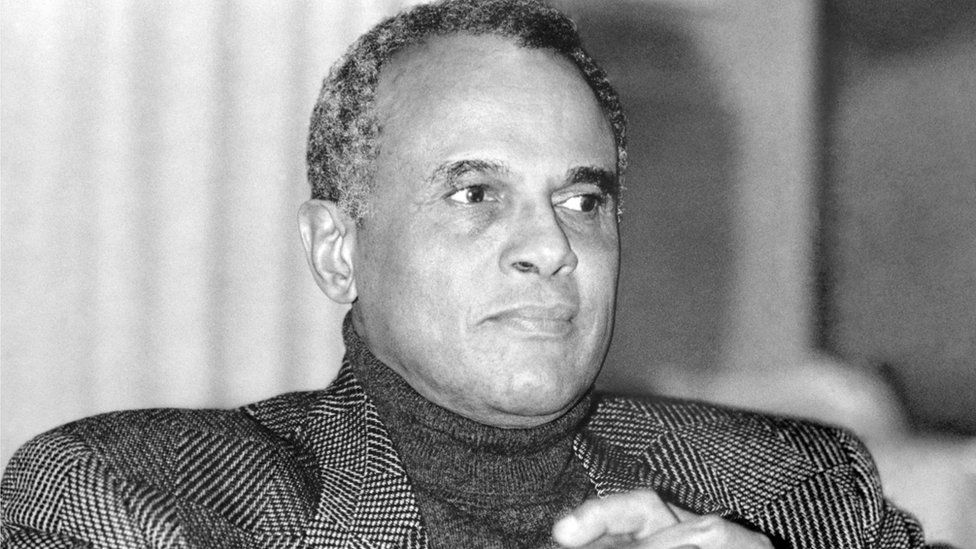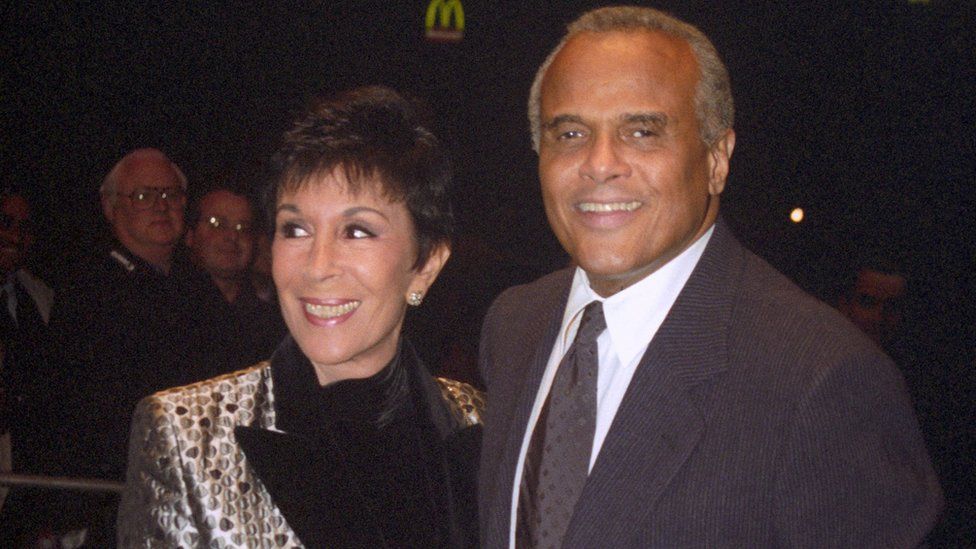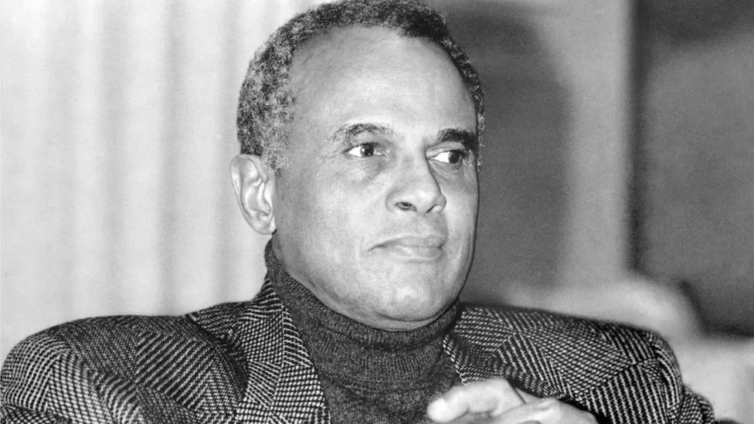Harry Belafonte, the singer and actor who smashed racial barriers in the US, has died at home in Manhattan, aged 96.
One of the most successful African-American pop stars in history, he scored hits with Island In The Sun, Mary's Boy Child and the UK number one Day-O (The Banana Boat Song).
But his greatest achievements were as a campaigner for black civil rights in the US.
He died of congestive heart failure, said his spokesman Ken Sunshine.
Actress Mia Farrow was among the first to pay tribute, remembering Belafonte as a "beautiful singer," and "a deeply moral and caring man".
"Miss you already," she tweeted.
Multi-million seller
Often dubbed the King Of Calypso, Belafonte was born in Harlem, New York, in 1927.
A high school drop out, he joined the Navy during the Second World War, working as a munitions loader at a base in New Jersey.
After the war, he pursued his dream of becoming an actor, studying drama at Erwin Piscator's famed Dramatic Workshop alongside the likes of Marlon Brando, Walter Matthau and Tony Curtis.
He paid for the classes by singing at New York clubs, where he was backed by groups that included Miles Davis and Charlie Parker.
That led to a recording contract and, in a search for material, Belafonte began to study the folk song archives at the US Library of Congress, alighting on the Calypso music his parents had grown up with.
It proved to be a wise move. The handsome young star sparked a fad for the genre with songs like Jamaica Farewell and Day-O (a song about Caribbean dock workers), both of which featured on his third album, Calypso.
Released in 1956, it topped the Billboard charts and was said to be the first album by a solo artist to sell more than a million copies in the US.

His success was such that he was the first black person allowed to perform in many upmarket US venues - including some that had been off-limits to artists like Louis Armstrong and Ella Fitzgerald.
He made his Broadway debut in the musical John Murray Anderson's Almanac in 1953, for which he won a Tony Award for supporting actor. He later appeared in films, scoring his first lead role in Island in the Sun, where he starred alongside James Mason, Joan Fontaine and Joan Collins, with whom he had an affair.
Over his career, he recorded more than 30 albums, including collaborative records with Nana Mouskouri, Lena Horne, and Miriam Makeba.
Bob Dylan made his first recorded appearance playing harmonica on Belafonte's 1962 album, Midnight Special.

A close friend of Martin Luther King, he was a visible supporter of the civil rights movement, who bankrolled several anti-segregation organisations and bailed Dr King and other activists out of jail.
He also campaigned against poverty, apartheid and Aids in Africa; and became an ambassador for Unicef, the United Nations children's fund.
In 1985, he organised the charity single We Are the World, an all-star musical collaboration that raised money for famine relief in Ethiopia.
After seeing a grim news report on the famine, he decided that American artists needed to raise money in the same way Bob Geldof and Midge Ure had done with the song Do They Know It's Christmas? a year earlier.
Featuring superstars like Michael Jackson, Stevie Wonder, Bruce Springsteen, Bob Dylan, Ray Charles and Diana Ross, the song - written by Jackson and Lionel Richie - raised millions of dollars.
"A lot of people say to me, 'When as an artist did you decide to become an activist?'" Belafonte said in a National Public Radio interview in 2011. "I say to them, 'I was long an activist before I became an artist.'"
Even in his late 80s, Belafonte was still speaking out on race and income equality and urged President Barack Obama to do more to help the poor.
Fiercely left-wing, he campaigned against nuclear armament, and caused controversy in 2006 when, in a meeting with Venezuelan president Hugo Chavez, he described US president George W Bush as "the greatest terrorist in the world".
Belafonte also compared Bush's secretaries of state Colin Powell and Condoleezza Rice, both of whom were black, to slaves who worked in their master's house rather than in the fields.
Statements like those made the star a frequent target of criticism, but he continued to be honoured for his artistry and humanitarian work.
Among his many awards, Belafonte was bestowed with a Kennedy Center Honor in 1989 and the National Medal of Arts in 1994. He was an EGOT - one of a rare group of people who have received all four of entertainment's biggest awards, an Emmy, a Grammy, an Oscar and a Tony.
Belafonte was married three times. He and his first wife Marguerite Byrd had two children, including actress-model Shari Belafonte. He also had two children with second wife Julia Robinson, a former dancer.
Latest Stories
-
Closure and reopening of Ghana’s embassy in Washington D.C. – A needless embarrassment to Ghana
14 minutes -
Today’s Front pages: Friday, May 30, 2025
15 minutes -
Friday, June 6 declared public holiday for Eid-ul-Adha
34 minutes -
Bawumia: A Great Asset to the NPP, and a Ready-Made Leader in Waiting for Ghana
43 minutes -
Once-shunned Ghana bonds deliver best returns in May
54 minutes -
Harvard agrees to relinquish early photos of enslaved people, ending a legal battle
2 hours -
Free Zones Authority gets new board, Trade Minister chairs
2 hours -
Explainer: Why one dollar can’t be one cedi
2 hours -
NRSA to sue MMDAs for unlawful siting of billboards
2 hours -
Government to train MMDAs to use data for planning
2 hours -
Effutu NDC sympathizers protest Mahama’s new MCE nominee
2 hours -
BoG urges deep structural reforms for economic reset
3 hours -
Ghana-Germany trade hits €180.9m in first quarter of 2025
3 hours -
Police arrest 26 suspects in drug operation at Aflao
3 hours -
Police arrest 10 cybercrime suspects
3 hours

